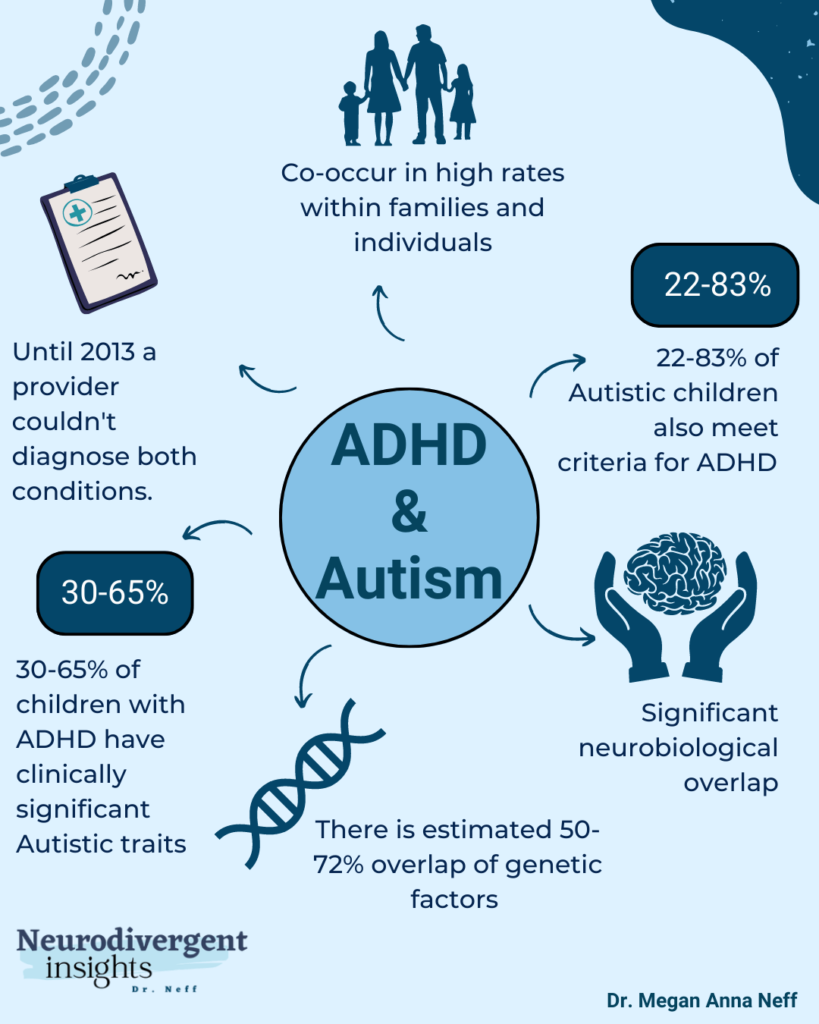Autism, Intellectual Disability, And ADHD: A Study On Co-occurring Conditions

Table of Contents
Defining the Conditions
Before delving into their co-occurrence, let's briefly define each condition:
-
Autism Spectrum Disorder (ASD): ASD is a complex neurodevelopmental disorder characterized by persistent deficits in social communication and interaction, and restricted, repetitive patterns of behavior, interests, or activities. Symptoms can range widely in severity, leading to a spectrum of presentations.
-
Intellectual Disability (ID): ID is characterized by significant limitations both in intellectual functioning (reasoning, learning, problem-solving) and in adaptive behavior (conceptual, social, and practical skills), originating before the age of 18.
-
Attention-Deficit/Hyperactivity Disorder (ADHD): ADHD is a neurodevelopmental disorder marked by inattention, hyperactivity, and impulsivity. These symptoms can significantly interfere with daily functioning across various settings.
This article aims to illuminate the interplay between these three conditions, emphasizing the importance of early diagnosis and intervention for optimal management. Early identification is critical in mitigating the challenges associated with these co-occurring neurodevelopmental disorders.
The Prevalence of Co-occurring Autism, Intellectual Disability, and ADHD
A statistically significant overlap exists between autism, intellectual disability, and ADHD. Research consistently demonstrates a higher prevalence of ID and ADHD among individuals diagnosed with ASD. The exact percentages vary depending on the study population and diagnostic criteria used, but several studies point to substantial co-occurrence rates:
-
Autism and ID: A significant percentage (approximately 30-70%, depending on the study) of individuals with autism also meet the criteria for intellectual disability. This co-occurrence is often explained by shared genetic factors and overlapping neurological pathways affecting cognitive development.
-
Autism and ADHD: Studies show a considerable overlap between autism and ADHD, with estimates ranging from 30% to 50% of individuals with autism also exhibiting symptoms of ADHD. This overlap highlights the challenges in differentiating between the inattentive and hyperactive features of both conditions.
-
ID and ADHD: Similarly, individuals with intellectual disability also show a higher prevalence of ADHD compared to the general population. The exact percentage is variable and requires further research.
These high co-occurrence rates emphasize the need for comprehensive diagnostic assessments that consider the possibility of multiple conditions. Further research is needed to fully understand the underlying genetic and environmental factors contributing to this overlap. Reputable sources like the Centers for Disease Control and Prevention (CDC) and the National Institutes of Health (NIH) provide valuable data on the prevalence of these disorders.
Diagnostic Challenges and Differential Diagnosis
Differentiating between autism, intellectual disability, and ADHD can be challenging due to significant symptom overlap. For example, inattention, hyperactivity, and social difficulties are features present in all three conditions. Accurate diagnosis requires a comprehensive assessment conducted by qualified professionals. This process typically includes:
-
Thorough history taking: Detailed information about developmental milestones, behavioral patterns, and family history is crucial.
-
Behavioral observations: Observing the individual in various settings helps clinicians assess the severity and impact of symptoms.
-
Standardized diagnostic tools: Tools like the Autism Diagnostic Observation Schedule (ADOS), the Autism Diagnostic Interview-Revised (ADI-R), and the Wechsler Intelligence Scale for Children (WISC) are essential for a reliable diagnosis.
Professionals like psychologists, psychiatrists, and developmental pediatricians play a vital role in this process, utilizing their expertise to accurately distinguish between these conditions and develop appropriate intervention plans.
Impact of Co-occurring Conditions on Individuals and Families
The presence of co-occurring autism, ID, and ADHD significantly impacts individuals and their families. Challenges can emerge across multiple domains:
-
Academics: Learning difficulties are common, demanding individualized educational programs (IEPs) tailored to address specific needs.
-
Social interactions: Social communication deficits, coupled with inattention and impulsivity, often lead to difficulties in forming and maintaining relationships.
-
Daily living skills: Adaptive functioning may be impaired, requiring support with self-care, household tasks, and independent living skills.
-
Behavioral challenges: Increased irritability, aggression, and self-injurious behaviors may be present, adding significant stress for families.
The burden on families is substantial, encompassing emotional strain, financial pressures related to therapies and specialized care, and the impact on siblings and other family members. Strong support systems, including respite care, family therapy, and support groups, are crucial for coping with the challenges.
Effective Interventions and Treatment Strategies
Managing co-occurring autism, ID, and ADHD requires a multidisciplinary approach involving various interventions and treatment strategies:
-
Behavioral interventions: Applied Behavior Analysis (ABA) and Positive Behavior Support (PBS) are effective in addressing behavioral challenges and improving adaptive skills.
-
Speech and language therapy: Targeting communication deficits is crucial, particularly in individuals with autism and ID.
-
Occupational therapy: Focuses on improving fine motor skills, sensory processing, and daily living skills.
-
Pharmacological interventions: Medication may be necessary to manage specific symptoms, such as inattention or hyperactivity in ADHD, but should be used judiciously and under the guidance of a qualified psychiatrist.
-
Family therapy and support groups: Provide families with education, coping strategies, and a sense of community. Individualized Education Programs (IEPs) in educational settings are essential to address specific learning needs.
A collaborative approach involving families, educators, and healthcare professionals is paramount for successful intervention.
Navigating the Complexities of Co-occurring Autism, Intellectual Disability, and ADHD
In conclusion, the co-occurrence of autism, intellectual disability, and ADHD presents significant diagnostic and management challenges. Early diagnosis is crucial, as timely intervention significantly improves outcomes. The impact extends beyond the individual, profoundly affecting families and requiring comprehensive support. Effective management relies on a collaborative approach, integrating various therapies and strategies tailored to individual needs. It is vital for families and caregivers to seek professional help if they suspect co-occurring conditions. Learn more about diagnosing and managing co-occurring autism, intellectual disability, and ADHD to provide the best possible support for those affected. Find support and resources for families dealing with co-occurring autism, intellectual disability, and ADHD to navigate this complex journey.

Featured Posts
-
 How Arne Slots Liverpool Challenged For The Premier League
Apr 29, 2025
How Arne Slots Liverpool Challenged For The Premier League
Apr 29, 2025 -
 Capital Summertime Ball 2025 Tickets A Step By Step Guide
Apr 29, 2025
Capital Summertime Ball 2025 Tickets A Step By Step Guide
Apr 29, 2025 -
 Cnn Interview Alan Cumming On His Favorite Childhood Activity In Scotland
Apr 29, 2025
Cnn Interview Alan Cumming On His Favorite Childhood Activity In Scotland
Apr 29, 2025 -
 Nyt Spelling Bee Answers March 14 2025 Find The Pangram
Apr 29, 2025
Nyt Spelling Bee Answers March 14 2025 Find The Pangram
Apr 29, 2025 -
 Papal Conclave Convicted Cardinals Unexpected Request
Apr 29, 2025
Papal Conclave Convicted Cardinals Unexpected Request
Apr 29, 2025
Latest Posts
-
 Yate Recycling Centre Incident Air Ambulance On Scene
Apr 30, 2025
Yate Recycling Centre Incident Air Ambulance On Scene
Apr 30, 2025 -
 Reduire La Mortalite Routiere L Efficacite Des Glissieres De Securite Sur Les Routes Francaises Or Adapt The Country As Needed
Apr 30, 2025
Reduire La Mortalite Routiere L Efficacite Des Glissieres De Securite Sur Les Routes Francaises Or Adapt The Country As Needed
Apr 30, 2025 -
 Air Ambulance Called To Incident Near Yate Recycling Centre
Apr 30, 2025
Air Ambulance Called To Incident Near Yate Recycling Centre
Apr 30, 2025 -
 Ameliorer La Securite Routiere L Installation De Glissieres Un Investissement Pour Sauver Des Vies
Apr 30, 2025
Ameliorer La Securite Routiere L Installation De Glissieres Un Investissement Pour Sauver Des Vies
Apr 30, 2025 -
 Get Google Slides Free Android I Os Web App Download
Apr 30, 2025
Get Google Slides Free Android I Os Web App Download
Apr 30, 2025
